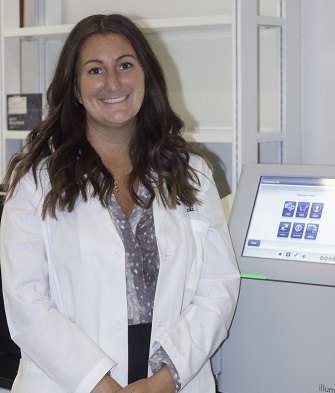Nicole Novroski
Dr. Nicole Novroski is a forensic biologist in the Forensic Science Program, housed within the Department of Anthropology at UTM. She specializes in using massively parallel sequencing (MPS; also known as next-generation sequencing) coupled with novel approaches and methodologies for forensic human identity testing. Her current focus is in the exploration of previously uncharacterized genetic markers for improved DNA mixture de-convolution. Dr. Novroski’s focus also includes the characterization of sequence variation for human identity markers, and in the generation of sequence-based allele frequencies (and other population studies) for forensic applications worldwide.
As her research program grows, Dr. Novroski would like to expand her focus to include research streams in the areas of computational biology as it pertains to forensic genetic data, microbial forensics and improved DNA methodologies for missing persons and unidentified human remains (including phenotype, ancestry, and craniofacial determinations using genetic markers). Outside of the field of forensics, Dr. Novroski is passionate about molecular genetics, and the study of biomarkers and pharmacogenomics for personalized medicine and molecular autopsy applications.
Education
Ph.D. (UNTHSC, 2018)
Courses
For the 2021-2022 Academic Year, Dr. Novroski will be offering the following courses at the undergraduate level: FSC314H5F (Forensic Biology in the News; Fall 2021), FSC315H5F (Forensic Biology; Fall 2021), FSC415H5S (Advanced Methods in Forensic Biology; Winter 2022), FSC416H5S (Population Genetics, Winter 2022). At the graduate level, Dr. Novroski will be offering ANT3033H5 (Advanced Research Seminar III: Molecular Population Genetics, Fall 2021).
Publications
Novroski, N.M.M., Wendt, F.R., Woerner, A.E., Bus, M.M., Coble, M.D., Budowle, B. (2018). Expanding beyond the current core STR loci: An exploration of 73 STR markers with increased diversity for enhanced DNA mixture deconvolution. Forensic Science International: Genetics, 38: 121-129.
Woerner, A.E., Novroski, N.M.M., Wendt, F., Ambers, A., Wiley, R., Schmedes, S.E., Budowle. B. (2018). Forensic human identification with targeted microbiome markers using nearest neighbor classification. Forensic Science International: Genetics, 38: 130-139.
Novroski, N.M.M., Woerner, A.E., Budowle, B. (2018). Potential highly polymorphic short tandem repeat markers for enhanced forensic identity testing. Forensic Science International: Genetics, 37: 162-171.
King, J.L., Churchill, J.D., Novroski, N.M.M., Zeng, X., Warshauer, D.H., Seah, L-H., Budowle, B. (2018). Increasing the discrimination power of ancestry-and identity-informative SNP loci within the ForenSeq™ DNA Signature Prep Kit. Forensic Science International: Genetics, 36: 60-76.
Novroski, N.M.M., Woerner, A.E., Budowle, B. (2018). Insertion within the flanking region of the D10S1237 locus. Forensic Science International: Genetics, 35: e4-e6.
Schmedes, S.E., Woerner, A.E., Novroski, N.M.M., Wendt, F., King, J.L., Budowle. B. (2017). Targeted sequencing of clade-specific markers from skin microbiomes for forensic human identification. Forensic Science International: Genetics, 32: 50-61.
Ambers, A., Wiley, R., Novroski, N., Budowle, B. (2017). Direct PCR Amplification of DNA from Human Bloodstains, Saliva, and Touch Samples Collected with microFLOQ® Swabs. Forensic Science International: Genetics, 32: 80-87.
Churchill, J.D., Novroski, N.M.M., King, J.L., Seah, L.H., Budowle, B. (2017). Population and Performance Analyses of Four Major Populations with Illumina’s FGx Forensic Genomics System. Forensic Science International: Genetics, 30: 81-92.
Wendt, F.R., King, J.L., Novroski, N.M.M., Churchill, J.D., Ng, J., Oldt, R.F., McCulloh, K.L., Weise, J., Smith, D.G., Kanthaswamy, S., Budowle, B. (2017). Flanking Region Variation of ForenSeq™ DNA Signature Prep Kit STR and SNP Loci in Yavapai Native Americans. Forensic Science International: Genetics, 28: 146-154.
Novroski, N.M.M., King, J.L., Churchill, J.D., Seah, L.H., Budowle, B. (2016). Characterization of genetic sequence variation of 58 STR loci in four major population groups. Forensic Science International: Genetics, 25: 214-226.
Wendt, F., Warshauer, D.H., Zeng, X., Churchill, J.D., Novroski, N.M.M., Song, B., King, J.L., LaRue, B.L., Budowle, B. (2016). Massively parallel sequencing of 68 insertion/deletion markers identifies novel microhaplotypes for utility in human identity testing. Forensic Science International: Genetics, 25: 198-209.
Wendt, F., Churchill, J.D., Novroski, N.M.M., King, J.L., Budowle, B. (2016). Genetic Analysis of the Yavapai Native Americans from West-Central Arizona. Forensic Science International: Genetics, 24: 18-23.
Warshauer, D., Churchill, J., Novroski, N., King, J., Budowle, B. (2015). Novel Y-Chromosome Short Tandem Repeat Variants Detected Through the Use of Massively Parallel Sequencing. Genomics, Proteomics & Bioinformatics, 13(4): 250-257.
King, J., LaRue, B., Novroski, N., Stoljarova, M., Seo, S., Warshauer, D., Davis, C., Zeng, X., Parson, W., Sajantila, A., Budowle, B. (2014). High-quality and high-throughput massively parallel sequencing of the human mitochondrial genome using the Illumina MiSeq. Forensic Science International: Genetics, 12:128-135.
Feia, A., Novroski, N. (2013). The Evaluation of Possible False Positives with Detergents when Performing Amylase Serological Testing on Clothing, Journal of Forensic Sciences, 58(s1): s183-s185.
Dr. Novroski is currently seeking graduate students. Prospective students should contact Dr. Novroski directly via e-mail.
People Type:
Research Area:
Research Keywords: Forensic Biology, Forensic Genetics, Human Identification, Ancestry, Genotype phenotype relationships, Population Genetics, Missing Persons, Massively Parallel Sequencing
Research Region: Canada, worldwide



